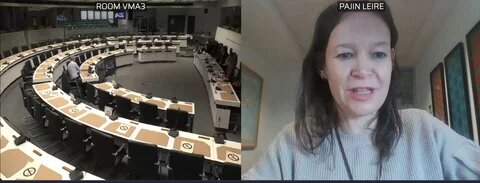On the morning of 26 November, the Latin America Follow-up Committee (LAFC) of the External Relations Team (REX) was held at the European Economic and Social Committee (EESC) with the participation and intervention of the President of the EU-LAC International Foundation, Leire Pajin Iraola.
The meeting was opened by Dimitri Dimitriadis, President of the REX Section of the EESC, who presented the objective of the meeting to address the current issues on which the committees are working with the countries of the Latin America and Caribbean (LAC) region. The first part of the meeting was attended by delegates from the Follow-up Committee for Latin America, the EU Internal Advisory Group in the framework of the Trade Agreement between the European Union (EU) and Colombia, Peru and Ecuador, the European Advisory Group for the Association Agreement with Central America and the EU-Chile Joint Consultative Committee.
Among the most important aspects examined, it is worth mentioning that at the centre of the discussion in the working groups are issues such as the fight against deforestation, respectful treatment of biodiversity, and the achievement of the articulation of trade and investment mechanisms capable of articulating the environmental and labour rights of the societies that make up the LAC countries and the EU. The incorporation of civil society in the decision-making processes in the LAC region and the opening of channels for dialogue on the conditions for fair trade between governments, trade union groups, non-governmental organisations and the European Union are also at the centre of concern.
This was followed by a discussion on the political situation and the impact of the pandemic and recovery after COVID-19 in LAC. This session was led by Javi López, Co-chair of the EuroLat group of the European Parliament, Claudia Gintersdorfer, Head of the Regional Affairs Division of the European External Action Service (EEAS) and Haydee Castillo Flores, Human Rights Defender of Nicaragua. The President of the EU-LAC Foundation, Leire Pajín Iraola, also spoke, stressing that Latin America, the Caribbean and the European Union share the same values and challenges and that the two regions should face global challenges together.
Concerning the most relevant conclusions, it should be noted that in the economic sphere there are two priorities for the EESC. On the one hand, it is necessary to continue and conclude with satisfaction the renewal of the bilateral agreements with Chile and Mexico, and in turn the ratification of the EU-MERCOSUR trade agreement, an agreement which, if signed, would be the largest trade agreement signed in the world to date. On the other hand, the EU countries should boost and strengthen their trade relations with the region, while China has acquired greater prominence, and to date, has multiplied trade with the region by 26%, and is now the second most important investor.
In the area of bi-regional integration, the concern of not having been able to hold an EU-CELAC Summit in the last six years was also discussed, as well as the need to strengthen political dialogue between the two regions, for which reason the importance of holding a virtual leaders’ meeting of the two regions on 2 December, with the participation of the pro-tempore presidencies of the Latin American regional and sub-regional organisations for the year 2021, was highlighted. The objective of this meeting is to follow in the footsteps of the Informal Ministerial Meeting in December 2020 in Berlin and join forces for a sustainable recovery from the pandemic caused by COVID-19, and work together to accelerate the ecological transition; promote a human-centred digital agenda; promote social cohesion and fight inequalities.
Finally, the importance of working across all EU institutions on issues such as sustainable and inclusive economy, democracy, security and migration, gender, social cohesion and the fight against inequalities, among others, was also discussed. For these reasons, the President of the EU-LAC Foundation, Leire Pajín, underlined the willingness of the international organisation to offer its spaces and help in the analysis of the bi-regional partnership processes.
